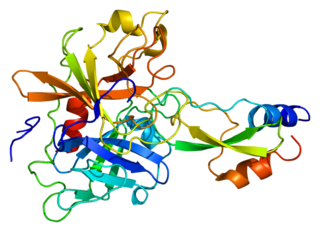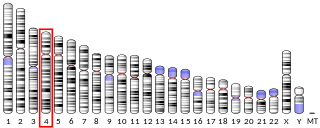
Maspin is a protein that in humans is encoded by the SERPINB5 gene. This protein belongs to the serpin superfamily. SERPINB5 was originally reported to function as a tumor suppressor gene in epithelial cells, suppressing the ability of cancer cells to invade and metastasize to other tissues. Furthermore, and consistent with an important biological function, Maspin knockout mice were reported to be non-viable, dying in early embryogenesis. However, a subsequent study using viral transduction as a method of gene transfer was not able to reproduce the original findings and found no role for maspin in tumour biology. Furthermore, the latter study demonstrated that maspin knockout mice are viable and display no obvious phenotype. These data are consistent with the observation that maspin is not expressed in early embryogenesis. The precise molecular function of maspin is thus currently unknown.

Kallikrein-1 is a protein that in humans is encoded by the KLK1 gene. KLK1 is a member of the peptidase S1 family.

Neural precursor cell expressed developmentally downregulated gene 4-like (NEDD4L) or NEDD4-2 is an enzyme of the NEDD4 family. In human the protein is encoded by the NEDD4L gene. In mouse the protein is commonly known as NEDD4-2 and the gene Nedd4-2.

Kallikrein-2 is a protein that in humans is encoded by the KLK2 gene, and is particularly associated with prostatic tissue.

The SCNN1G gene encodes for the γ subunit of the epithelial sodium channel ENaC in vertebrates. ENaC is assembled as a heterotrimer composed of three homologous subunits α, β, and γ or δ, β, and γ. The other ENAC subunits are encoded by SCNN1A, SCNN1B, and SCNN1D.

Suppressor of tumorigenicity 14 protein, also known as matriptase, is a protein that in humans is encoded by the ST14 gene. ST14 orthologs have been identified in most mammals for which complete genome data are available.

Kallikrein-10 is a protein that in humans is encoded by the KLK10 gene.

Fibroblast activation protein alpha (FAP-alpha) also known as prolyl endopeptidase FAP is an enzyme that in humans is encoded by the FAP gene.

Beta-adducin is a protein that in humans is encoded by the ADD2 gene.

Kallikrein-related peptidase 4 is a protein which in humans is encoded by the KLK4 gene.

Kunitz-type protease inhibitor 1 is an enzyme that in humans is encoded by the SPINT1 gene.

Glia-activating factor is a protein that in humans is encoded by the FGF9 gene.

Kallikrein-11 is a protein that in humans is encoded by the KLK11 gene.

Serpin B6 is a protein that in humans is encoded by the SERPINB6 gene.

Transmembrane protease, serine 2 is an enzyme that in humans is encoded by the TMPRSS2 gene. It belongs to the TMPRSS family of proteins, whose members are transmembrane proteins which have a serine protease activity. The TMPRSS2 protein is found in high concentration in the cell membranes of epithelial cells of the lung and of the prostate, but also in the heart, liver and gastrointestinal tract.

Kallikrein-14 is a protein that in humans is encoded by the KLK14 gene.

Corin, also called atrial natriuretic peptide-converting enzyme, is a protein that in humans is encoded by the CORIN gene.

Thymus-specific serine protease is an enzyme that in humans is encoded by the PRSS16 gene.

Kallistatin is a protein that in humans is encoded by the SERPINA4 gene.

Brain-specific serine protease 4 (BSSP-4), also known as serine protease 22 or tryptase epsilon, is an enzyme that in humans is encoded by the PRSS22 gene.




















